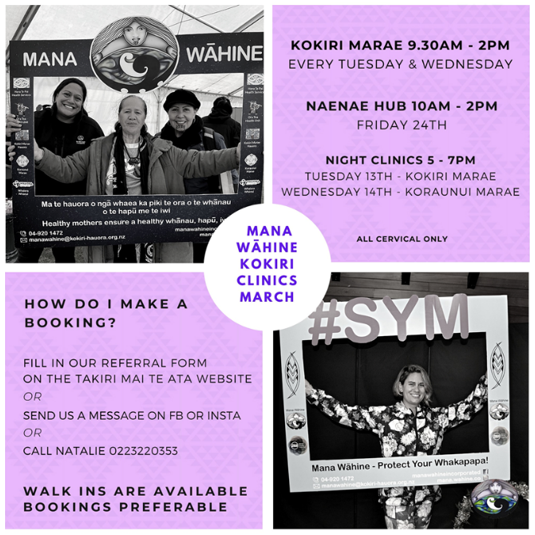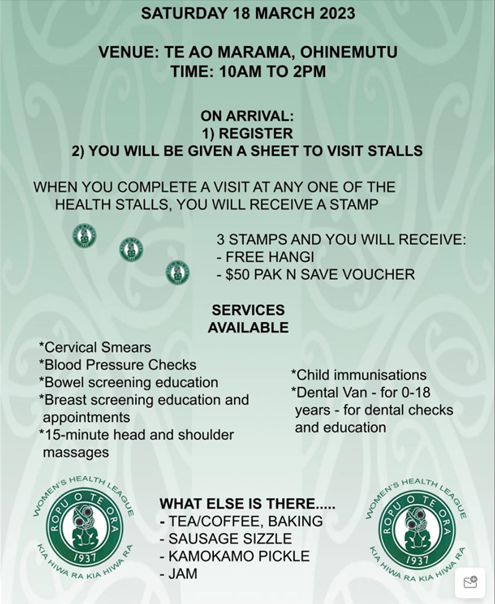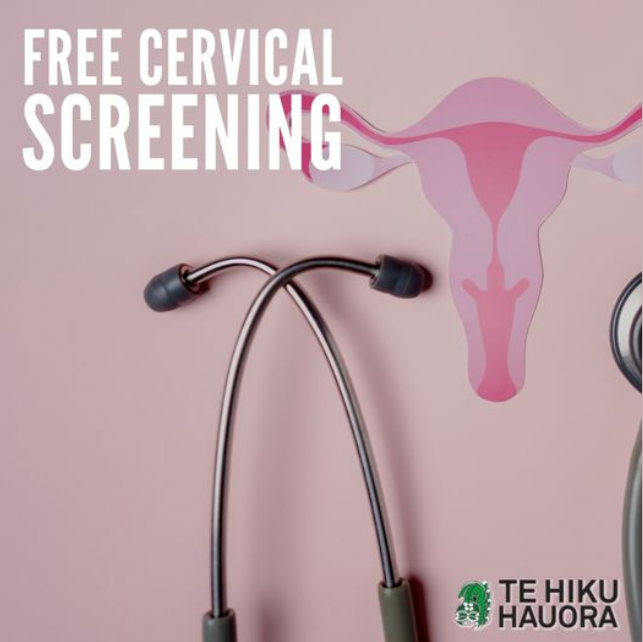National Cervical Screening Programme Sector Update – April 2023
What’s happening in the NCSP
Screening Initiatives
Awesome mahi continues to be done around the motu to keep people on the cervical screening pathway. See some of the free screening clinics shared below.


 FREE cervical screening in Kaitaia!
FREE cervical screening in Kaitaia!
Where: Te Runanga o Te Rarawa car park, 16 Matthews Ave, Kaitaia. Opposite the Breast Screening mobile clinic
When: 8.30am - 1.30pm Wednesday March 15th / Wednesday March 29th / Wednesday April 5th
No bookings required. For more information, contact Deidre 0800 808 4024 ext 625
New Zealand Gynaecological Cancer Foundation closes
The NZGCF New Zealand Gynaecological Cancer Foundation sadly closed in March. We share below the message from the co-chairs:
The New Zealand Gynaecological Cancer Foundation (NZGCF), the not-for-profit for women with gynaecological cancers, will close on 10 March 2023 due to resourcing challenges and the ability to have impact was often spread too thin.
Over the last fourteen years NZGCF have received over $2,000,000 in donations and:
- Worked to extend and enhance services for women living with gynaecological cancers.
- Provided information and support to grow greater awareness and understanding of gynaecological cancers and their impact.
- Worked with generous and committed donors and sponsors who supported NZGCF mission.
We know that many women and their whānau with gynaecological cancers can feel isolated, overwhelmed and a diagnosis can affect every aspect of your life.
During this transition, we think it is vital that the people who NZGCF currently support are not left without the specialist information, advice and support that we know gynaecological diagnoses, survivors and their families need.
This will be sad news for everyone concerned and likely to be a difficult and uncertain time for NZGCF friends, survivors, volunteers and staff. We have been in touch with NZ Cancer Organisation who has resources available to support. If you are worried or need help and support with gynaecological cancers contact the NZ Cancer Information Helpline Service 0800 226 237 or go to https://www.cancer.org.nz/
NZGCF would like to acknowledge and thank the commitment, contribution and generosity of regular donors, sponsors, volunteers and our staff and medical advisory council over the last few years to enable raising awareness, and supporting women with gynaecological cancers.
Ngā mihi nui
Dr Emma Ellis, Jillian Friedlander - Co-Chairs NZGCF
Haere! Haere! Haere!
NCSP Advisory and Action Rōpū
The rōpū met on 23 March. Minutes of previous meetings can be found here.
Support to Screening Services web page
The web page for our SSS teams supporting the work of both the National Cervical Screening Programme (NCSP) and BreastScreen Aotearoa (BSA) is available here.
Screening support services are available for eligible wāhine/whānau who are referred to, or who independently access services from the support to screening providers. This support can assist wāhine/whānau who experience barriers to accessing breast and cervical screening, assessment, and treatment services. Some support to screening providers have mobile teams who make community visits and home visits, while others are based in clinics around the motu.
Coverage app
The NCSP coverage app is now located here: https://tewhatuora.shinyapps.io/nsu-ncsp-coverage/
What’s happening with the HPV Primary Screening Project
The Road to Rollout
Last month we shared the news that HPV primary screening will begin to roll out in Aotearoa New Zealand in late July 2023, and promised to bring you more information in this edition of the Sector Update.
Achieving equity is a fundamental part of the aims of the HPV Primary Screening project. In Aotearoa New Zealand, people have differences in health that are not only avoidable but unfair and unjust. Equity recognises different people with different levels of advantage require different approaches and resources to get equitable health outcomes.
Active protection must include prioritisation of access to screening services and follow-up for Māori, Pacific and other groups who face barriers to screening. Our Te Tiriti o Waitangi and Equity strategy means reaching and supporting the approximately 40% of people who are not currently well-served by the NCSP programme.
There will be an equity focus for each of our detailed delivery roadmaps. For participants there will be a choice around the type of test they can do, and they can complete the initial screen in a setting more comfortable for them. Their beliefs and values will be understood and supported. More Māori and Pacific clinical and non-clinical staff will be involved in the screening pathway.
In primary and community care, training will include key cultural considerations that allow the delivery of care for all participants, especially Māori and Pacific priority groups. We will be able to bring initial screening closer to the whānau with the new screening pathways which allow us to encourage more un- and under-screened women through the process. Regional co-ordinators will be able to leverage the improved Register to target more Māori and Pacific participants with support.
In essence this means:
Equity Priorities
- New pathways that empower participants with choice; aim to increase participation in the most under-screened and unscreened populations and decrease barriers to entry for all participants.
- Enhanced health equity for wāhine Māori and Pacific women through the more acceptable primary screening test combined with targeted outreach to the under-screened population.
- Expanding the workforce with more Māori and Pacific clinical and non-clinical staff involved in the delivery of screening.
We can now share the news that the rollout will be achieved in a phased approach – three phases in total -- with 26 July being the first day when HPV testing becomes Aotearoa New Zealand’s primary screening test for cervical cancer prevention.
The first phase from late July is the Foundational Step, this is the initial rollout phase. In this phase participants will be able to choose a self- or clinician- taken swab, or an LBC sample which will first be tested for HPV, and if HPV is detected cytology will be performed. New clinical pathways and the 4 Sector Update April 2023 new NCSP-Register will be established. There will be a particular focus on Māori and Pacific participants and increasing screening in the under- or unscreened populations.
The second phase will be called Expanding Reach and will extend from August to December. The focus is on getting more people onto the screening pathway through notifications and new approaches, including under- and unscreened populations both not enrolled in primary care and those enrolled. Better information on screening histories will be available.
The third phase will be called Full Benefit and will extend from December to March 2024. This is where the full future vision of HPV primary screening will be achieved. A more complete pool of participants will be encouraged into screening, increasing our screening coverage, patient experience and whānau satisfaction. Participants can choose to self-test at home or in a wide variety of settings that work for them. All workforces involved in providing HPV primary screening services will have access to the right information to do their role in supporting wāhine and whānau. Our workforce will feel empowered through training and accreditation to advise and support participants through the new pathways. The full vision is:
- Empowering participants with greater consumer choice about what and how they can participate.
- Driving equitable outcomes for Māori and Pacific people.
- Creating a greater, more diverse workforce – including greater integration of kaimahi into pathways.
- Bringing together the services around the community and consumer.
Overall, the HPV primary screening project will support new clinical pathways that will provide greater choice to participants, increase screening in priority groups and reduce mortality rates in our communities.
What will be achieved:
a) HPV testing as the primary screening test – HPV testing will find more pre-cancers and prevent more cases of cervical cancer, supported by the speculum and colposcopy tests within the pathways.
b) New NCSP-Register – A single source of truth for screening records and individual schedules.
c) New pathways – Embedding more choice and flexibility into screening, removing barriers to entry and better supporting and increasing equitable outcomes for Māori and Pacific people.
d) Additional workforce and training – Accredited cervical screen-takers/GPs/midwives to do HPV testing as well as the LBC test. Other clinical workforces will be trained to support HPV primary screening, this will also be expanded through to our non-clinical workforce.
More information will be coming through our engagement with you explaining how different parts of the sector will be impacted by the change to HPV primary screening.
Engagement with the Sector Increasing
The HPV Primary Screening Project Team are ramping up our engagement with sector groups to share the latest information on the Road to Rollout. We are scheduling attendance at regional screen-taker updates throughout the motu.
The purpose of our presentations is to build screen-taker awareness, specifically on the changes, training and support for the transition to HPV primary screening. Over the next two months we have these hui planned:
- 4 April – Taranaki Screen-Takers (6 – 7.30pm in person New Plymouth and online)
- 5 April - Tairawhiti Screen-Takers (5.30 – 7pm in person)
- 18 April – Nelson/Marlborough Screen-Takers (5.45pm – 7.30pm in person Nelson and online)
- 1-3 May – Bay of Plenty (Tauranga May 1, 6 – 7.30pm, Whakatane May 2, 6 – 7.30pm, Rotorua May 3, 12.15-1.45pm) online options also available.
- 2 May – Otago Southland Screen-Takers (9 – 10.30am online)
- 11 May – Waikato Screen-Takers (6 – 7.30pm online)
An engagement hui with screen-takers in Wellington, the Hutt Valley and Wairarapa was held on March 29.
Work is underway to provide updates in other parts of Aotearoa. We are working with the Hawke’s Bay and Mid Central regional coordination teams as well as the Metro Auckland Cervical Screening Operations Group to schedule their updates from May onwards.
A big mihi to the regional teams we have been working with to get these sessions scheduled. We have really appreciated the commitment you have for your region and assisting us with getting education out to the sector.
If you would like more information on one of the sessions in your region, please contact your regional coordinator directly, or alternatively we can assist at [email protected]
Webinar and Resources
We have created a page on the NSU website with summaries of information from the Goodfellow Unit webinar held in September.
The page can be found here and contains:
- A PDF of Dr John McMenamin’s original presentation
- A PDF of questions received from attendees, grouped into relevant sections, and answers provided by our clinical team
- A PDF called Moving to HPV testing for primary cervical screening, which provides more detailed and expanded content than the original presentation, and which the sector can call on as a further resource.
A special shout out to the Te Toka Tumai Auckland and Waitematā Planning, Funding and Outcomes team who provided the webinar. The whole webinar is available to view on Goodfellow here: https://www.goodfellowunit.org/events-and-webinars/cervical-screening-up... which includes the popular presentations from the Te Toka Tumai Lead Colposcopist Dr Deralee Flower, and HPV self-testing research team at Te Toka Tumai and Waitematā Dr Karen Bartholomew and Nurse Specialist Jane Grant.
Educational Video for Health Sector
Prior to Christmas we posted an online video for health sector professionals detailing the move to HPV primary screening. Based on feedback received, we’re in the process of slightly revising some wording for greater clarity. The video is close to being finalised and an update will be provided to let you know when the video is available.
This will be the first in a series of planned educational and learning tools to be made available in the run up to the transition to HPV testing in late July 2023. Keep an eye out for our updates as more resources become available.
Unit Standard Update
Toitū te Waiora with Te Whatu Ora are undertaking a review of Unit Standard 29556, Undertake Cervical Screening. Accreditation of nurses to support cytology procedures as part of follow up and surveillance will continue to be an important part of the new clinical pathway. Public consultation was undertaken from 16 December to 23 January and subsequently the new standard has been endorsed by the HPV Primary Screening Project Steering Committee and has now been submitted to NZQA. We will share the link to the standard when it is available.
Parliamentary Review Committee
The final sign-out process is underway, after which the PRC report will be tabled in the House of Representatives before it is published. We will provide the link to the report when it is available. Clinical Practice Guidelines The NCSP Clinical Practice Guidelines have been reviewed and are currently going through the editing process.
NCSP Policies and Standards
Work is progressing on updating the NCSP Laboratory and Colposcopy Policies and Standards, with feedback from the working groups collated and reviewed. They are going through the editing process before they can be published.
New HPV Primary Screening Resources
The NCSP has contracted the design agency Big River Creative to develop the public-facing resources for the new HPV primary screening programme. Big River Creative is a 100% Māori-owned, Māori and Pacific-led creative agency. It specialises in cultural graphic design and infographics to create mana-enhancing and culturally-responsive resources with a Te Tiriti o Waitangi focus that will resonate with priority audiences.
Immunisation Update
All our immunisation collateral is available on Dropbox for healthcare providers to use when promoting vaccinations. Please feel free to share this link and the collateral widely with your other healthcare colleagues: Dropbox: NIP – vaccine resources – Simplify your life.
For any other School-based Immunisation Programme collateral like consent forms for use by health professionals please visit the HealthEd website. You can also find a range of vaccination stories on our YouTube channel.
Answers to Your Questions
We are receiving regular feedback and questions to [email protected]. More information is available on the website here: Frequently asked questions | National Screening Unit (nsu.govt.nz). Answers to many clinical questions raised at the Goodfellow Unit webinar can be found in the link provided earlier in this newsletter.
Staying in Touch
If you have colleagues who would also like to receive this monthly update, they can join the distribution list by emailing us at [email protected]. We really appreciate your feedback and are here to answer any questions you may have.

